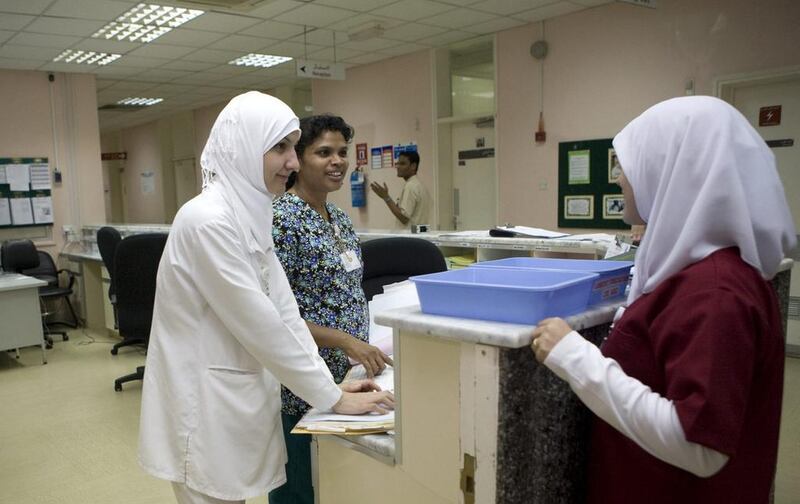Health experts have called on the UAE government to boost nurses’ salaries and reduce their hours as part of a wider effort to recruit more Emirati staff.
Senior hospital officials said much more needed to be done to change attitudes and encourage greater numbers of men and women into the profession.
Currently, Emiratis make up less than three per cent of nursing staff at Abu Dhabi Health Services Company (Seha), a leading government healthcare provider.
But medical staff claimed a combination of improving hours, broadening responsibilities and increasing wages could help drive up recruitment figures.
“We need to change the way people look at nurses,” said Dr Anwar Sallam, chief medical and clinical affairs officer at Seha.
“In the past they were perceived as doctor’s assistants but now that’s different. Today they’re on the front line and triage my patients.
“They know a lot about the management of patients and diseases and can help address patient and family concerns and questions.
“But we have a problem because as it stands the nursing profession here is not attractive.
“Let’s make it attractive be adjusting working hours and allowing nurses to work like other government employees.”
________________
Read more:
[ Abu Dhabi campaigns for young Emiratis to pursue medical careers ]
________________
Dr Anwar Sallam spoke out at the International Council of Nurses (ICN) conference held in Abu Dhabi.
The event was staged in collaboration with the Emirates Nursing Association (ENA) and Seha, which operates six major hospitals in the emirate as well as additional clinics and family medical centres.
Speaking to The National, Dr Sallam said Seha was committed to hiring 100 Emirati nurses a year.
His comments came after reports revealed that during the first day of a well-advertised nursing recruitment campaign last year, no Emiratis at all had applied.
Instead, officials had received thousands of applicants from Far East and Asia, including the Philippines and India.
Dr Ali Al Obaidli, chief clinical officer at Seha, said one area in urgent need of redress was to broaden the responsibilities of nursing staff in the Emirates.
He argued that by offering differing specialties within the profession, hospitals would be better able to encourage those considering a career in nursing to come forward.
“This is an area that we are working hard to develop,” he said. “Increasing the specialties for nurses will help us develop different career paths for them.
“Just like physicians have different career options, nurses too should have that option.
“Some might want to work with the elderly or in pediatrics or in behavioural sciences. Specialisations must be developed.”
According to recent figures, just under 7,900 nurses currently work in Seha-run hospitals. Of these, only 180 are Emirati - around three percent.
Experts said one of the factors behind such a low ratio was pay. Another leading cause was working hours.
Today, Emirati nurses working in government-run hospitals receive between Dh10,000 to Dh25,000 a month, as well as housing and education allowances.
By contrast, foreign nationals who work as nurses typically receive much less – between Dh4,000 and Dh15,000 a month.
Lord Crisp KCB, co-chair of Nursing Now, a global campaign group aiming to raise the profile of nursing around the world, agreed more need to be done to expand the role of nursing in the medical profession.
He said many countries treated nurses like “handmaidens” simply because of their sex.
“Nurses can do a lot more than they are allowed to do,” he said. “Too often they’re not able to work to their full capability.
“In many countries nurses prescribe drugs and you see nurse practitioners being the first responders in an emergency. They shouldn’t just be handmaidens of doctors.
“We want people to think about what nurses are capable of because in the long run they can have a bigger impact than doctors.
“You empower 23 million nurses (the current global figure) and that is the single biggest thing you can do improve health globally.”
As the law stands now, however, nurses working in the UAE are prevented from taking on greater responsibility.
Samah Mahmoud, chair of international nursing, midwifery and allied health conference (SINMAC) said: “We need the support of legislation.
“Currently the law does not allow nurses to prescribe medication or to be more than caregivers. They are not given a license.”
She said allowing nurses to prescribe and operate at independent clinics would boost interest in the profession and help drive recruitment.
Dr Sallem added: “The system needs to convince families that nursing is an excellent option for their children.
“Once we do that then it will be easy for families to buy in to and the image of nursing will change.”






